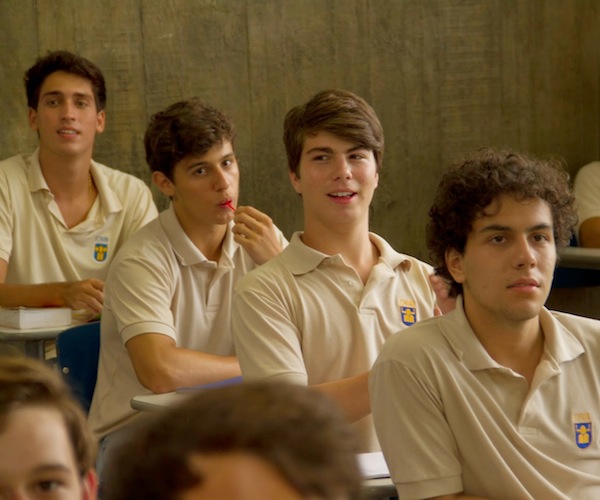Film Review: “Casa Grande” – When the 1% Takes a Tumble
In this powerful film, writer-director Fellipe Barbosa asks a number of pointed political and social questions about traumatic transitions.

A scene from “Casa Grande,” which is screening in the New Latin American Cinema series at the Museum of Fine Arts, Boston, Sunday, March 8.
Casa Grande, screening at Museum of Fine Arts Boston’s New Latin American Cinema, Boston, MA, on March 8.
By Paul Dervis
At first glance, Casa Grande or the Ballad of Poor Jean, winner of this year’s Rio de Janeiro Film Festival, fits neatly into the coming-of-age movie genre. But, on closer inspection, this Brazilian movie is clearly much, much more than that. It explores, in depth, class distinctions, race relations, and family conflict. There are plenty of humorous sequences, but ultimately this is a darkly serious piece about national upheaval.
Jean, played with utter conviction by Thales Cavalcanti, is a rich prep school slacker who would rather sleep than attend classes. In fact, he often naps through his seminars. He’s a senior and it is time for him to decide what he would like to pursue in college. Jean picks Communication, because it seems easier than more stringent disciplines, such as Law or Economics. It feels like a poor (or archly ironic) fit for him, because he is rarely able to communicate with either his parents or peers.
Jean’s main focus as the film begins is to get into the pants of Rita, the family maid. And he gets pretty close. She lets him in her bed, and he gets to rub oils on her mostly naked body. But she cuts him off before he can do the ultimate deed.
The family also has a cook and a driver. Jean is closest in the house to the latter, the elderly Severino (Gentile Cordeiro). He offers to help the young man get sex. The cook, a deeply religious woman, disapproves of almost everything going on in the estate.
And it is quite an estate! The father built it from scratch, complete with a jacuzzi and mammoth pool. It is a gated community and the parents live in constant fear that the unwashed masses will break in.
The father is a hedge fund mastermind, and it has served him well…until now. All his investments, as well as much of the wealth of his friends and other family members, are now circling the financial drain. And it is a slow flush. First, they need to let Severino go. Jean is told he is going off on an extended vacation, but the boy sees his old friend driving a dilapidated bus through the mean streets of Rio. Next, the fleet of cars begins to shrink. Jean’s credit card is canceled and a friend needs to bale him out at a nightclub. The buddy is never paid back. Jean finds himself on the outs with several of his classmates when their parents complain that the floundering hedge fund is responsible for their lost fortunes. And Jean’s tuition ends up unpaid.
Rita is fired. Jean’s mother finds provocative pictures of the maid in her bedroom, but we all know that is not why the worker is history. The cook quits; she hasn’t been paid in three months. The mother goes to work, selling other rich women cosmetics she once bought herself. And they are contemplating selling, God forbid, the Palace.
During this whirlwind Jean has found love. She’s a public school girl, half black and half Asian from ‘the other side of the tracks.’ Her name is Luiza. Bruno Amaya creates a character that is hard not to fall in love with. She is feisty, sensual, and smart. And she rubs the once-wealthy clan the wrong way. Is she a symbol of Rio’s future? And does that mean she relegates the family to Rio’s past? These are questions the family would rather not think about.
In this powerful film, writer-director Fellipe Barbosa asks a number of pointed cultural questions about traumatic transitions. He has exposed the growing pains of a combative culture of ‘have’ and ‘have nots’ caught up in a chaotic world that is turning traditional understandings of class and race topsy-turvy. The film moves at a harried pace, sprinkling bits of dark humor into its characters’ wounds without losing any of its empathetic spirit. It is a political film, excoriating a country that is only now introducing minority quotas in such fields as education and the liberal arts. It is a social film, with one eye on an elite class behind their closed doors and the other on the heinous poverty that permeates the slums of Rio.
First and foremost, Casa Grande is about a silly boy becoming a thoughtful man, replete with sadness and hope.
If only we could produce such films here. We did once…but it has been awhile.
Paul Dervis has been teaching drama in Canada at Algonquin College as well as the theatre conservatory Ottawa School of Speech & Drama for the past 15 years. Previously he ran theatre companies in Boston, New York, and Montreal. He has directed over 150 stage productions, receiving two dozen awards for his work. Paul has also directed six films, the most recent being 2011’s The Righteous Tithe.
Tagged: Boston, Casa Grande, Fellipe Barbosa, Museum of Fine Arts, New Latin American Cinema
